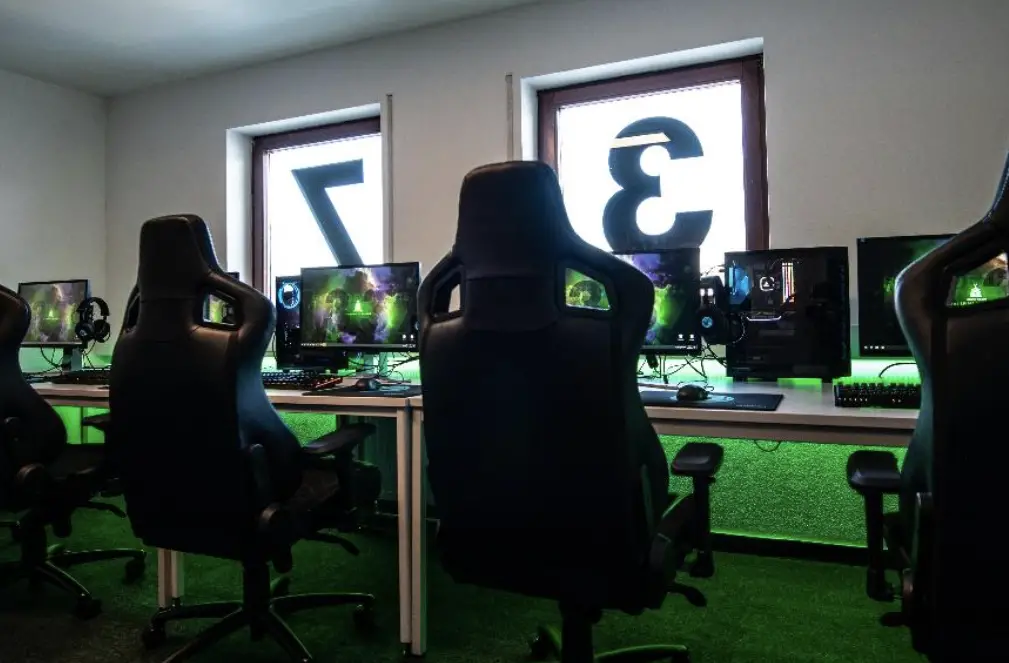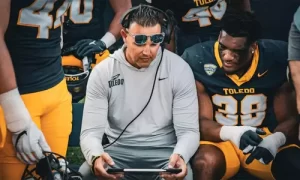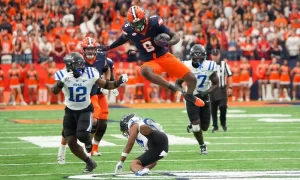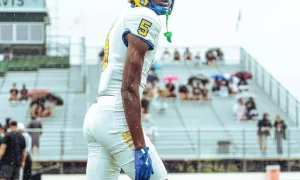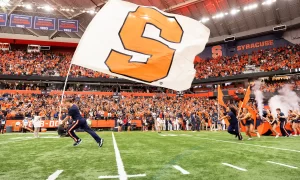Esports have grown from a specialized hobby to a worldwide phenomenon in recent years, attracting millions of players and spectators, not to mention revenues. Universities and colleges all around the world are beginning to see the benefits of incorporating eSports onto their campuses, not only as a kind of entertainment but also as a huge financial, social, and educational opportunity.
Here are some reasons why eSports are becoming more and more significant for universities.
Photo: Esports setup (source: https://unsplash.com/photos/black-office-rolling-chair-near-black-flat-screen-computer-monitor-sRQxXA5QqtE)
Over the past decade or so, eSports have experienced a spectacular ascent in the sports and entertainment sector, and it doesn’t appear to be slowing down. As more and more people tune in to see their preferred games involving some of the world’s top gamers, the eSports business has exploded in recent years. Over 318 million eSports fans are anticipated to exist globally by 2025, a substantial rise from the 215.2 million in 2020. By 2025, an estimated 322.7 million individuals are expected to watch eSports from time to time. These are just occasional viewers. A projected 640.8 million people worldwide will watch eSports this year, with 318.1 million of them being devoted fans.
Esports now rank as the eighth or ninth most-watched sports discipline worldwide, indicating that their popularity is growing quickly. Let’s not forget that growth in any sport carries growth in betting on it, not just in viewership. Revenue in the eSports betting market worldwide is projected to reach US$2.8bn in 2025. Revenue is expected to demonstrate an annual growth rate (CAGR 2025-2029) of 5.47%, leading to a projected market volume of US$3.5bn by 2029. It’s only a small piece of the cash flow from the growing sports gambling industry in total, which has infiltrated the major professional sports leagues of the US and beyond, embodied in the most profitable basketball betting operators, especially those online listed at https://bookmaker-expert.com/bookmakers/sports-betting/nba/.
Schools and institutions should follow these trends to assist students in learning, developing, and looking for chances in this fast-paced business, as the majority of viewers are teens and adults between the ages of 16 and 24.
Here’s why eSports are increasingly important for higher education institutions.
Bringing in and Keeping Students Onboard
Colleges may find eSports to be an effective recruiting tool. Offering eSports programs helps draw in potential students who would consider eSports to be a crucial component of their college decision-making process, as millions of young people are growing up surrounded by gaming.
Additionally, a strong eSports program can increase student retention. Students are more likely to remain involved and finish their degree programs if they experience a sense of belonging to extracurricular activities. Students who might not fit into other clubs or traditional sports can find a feeling of community and belonging through eSports.
Opportunities for Scholarships
Esports scholarships are now widely available from institutions, opening up new avenues for people to pursue higher education. This creates opportunities for gifted gamers who might not be as good in regular schooling or sports but show amazing talent in the competitive gaming industry. This can broaden the student body at universities and attract a fresh group of gifted people who might not have otherwise thought about enrolling.
Numerous educational institutions in the US and other countries have already acknowledged the thriving eSports sector. Their efforts to integrate eSports into their schools have already begun. Numerous universities in the US are introducing varsity teams that are supported by the school and offer scholarships. Miami University-Oxford, Maryville University, and the University of California-Irvine are among the universities on this list. And the journey doesn’t end there. The University of Chichester, Staffordshire University, and Nottingham Trent University in the UK, as well as Ohio State University, Becker College, and the University of Texas Arlington in the USA, have all introduced esports-related majors and degrees. In order to promote eSports and develop talent, Oxford University is also collaborating with Tencent, the company that owns Riot Games, to hold competitions and provide courses to students.
Additionally, by enabling schools to hire from a worldwide talent pool, these scholarships foster a more competitive and diverse learning environment that benefits all students.
Building Essential Skills for the Workforce of the Future
Beyond just gaming, eSports give kids a chance to gain useful skills that they may use in a variety of fields. Playing eSports gives youngsters skills that are highly valued in today’s job market, from communication and teamwork to strategic thinking, leadership, and problem-solving. Careers in media, entertainment, technology, and other fields can be directly impacted by these practical experiences.
Additionally, students who participate in eSports programs frequently acquire expertise in:
- Social media and marketing: Overseeing eSports teams’ presence on the Internet.
- Management of events: Putting together and advertising competitions and tournaments.
- Media production and broadcasting: Producing content and streaming games for an expanding audience.
Students can gain future employment chances through eSports, but that’s not all. As with any degree, it isn’t a guarantee of future employment. Nevertheless, eSports offer so much more than simply potential job opportunities. Similar to sports, eSports provide a fantastic opportunity to foster community and impart skills and life lessons to pupils. In order to compete successfully, students must dedicate numerous hours each day to developing team dynamics, devising innovative and distinctive tactics, and strengthening their mental toughness.
Creating an eSports organization, organizing weekly activities, managing the team, learning marketing techniques, organizing tournaments, reaching out to competing schools for participation, and locating sponsors are just a few of the administrative skills that students will need to acquire. Additionally, they must establish a community in which students can connect and form enduring friendships. In contrast to other extracurricular activities, students are leading the development of the eSports scene because it’s still in its infancy. They are not only actively participating in creating eSports from the ground up, but the students are also making progress in this endeavor.
Getting Students Ready for Jobs in a Developing Sector
It was predicted that the worldwide eSports business would generate up to 1.87 billion USD in 2025, with job prospects growing in a variety of industries, including:
- Development of games
- Management of events
- Partnerships for marketing and brands
- Creating and streaming content
- Coaching and team management
Colleges can establish themselves as leaders in a quickly expanding sector by creating eSports programs, which give students direct access to career opportunities in gaming and related sectors. These programs can be improved, and student internship and employment opportunities can be created by collaborating with game firms and eSports organizations.
Companies are searching for talent to fill the new positions created by esports, which saw an 185% growth in employment opportunities between 2018 and 2019. As an illustration, consider the recently introduced TSMU program, which was started by the well-known North American eSports team TSM (Team SoloMid). This initiative, which seeks to collaborate with college students to find and develop potential, is just one of several instances of the increasing need for workers in the eSports industry.
Technology firms like Twitch, Corsair, and Logitech, as well as game creators like Riot Games, EA, and Activision Blizzard, are all seeking individuals with eSports experience. These positions are only growing in popularity and will soon be considered very respectable career choices. The employment created by the eSports sector is numerous, ranging from designing and balancing gameplay for an AAA game title to working as a player agent and team manager on a formed eSports team.
Creating a Community and School Spirit
Students’ feeling of community and school spirit can be strengthened by eSports, with teams having the potential to develop devoted fan bases, much like traditional sports, as students band together to cheer on their classmates during competitions and tournaments.
Colleges can hold both in-person and virtual events to increase interest and involvement from alumni, instructors, and students. Additionally, by enabling students to compete and work together with peers from around the world, eSports events can be a means of connecting with a global audience.
Encouragement of Diversity and Inclusivity
Esports can be more inclusive than traditional sports, dismantling barriers based on background, gender, or physical ability. Esports belong to a group of very accessible sports because everyone who enjoys gaming can take part.
By creating a friendly atmosphere where students from different backgrounds may bond over a common interest, colleges can use esports as a platform to encourage diversity and inclusion on campus. A strong campus atmosphere where everyone feels like they belong is fostered by this inclusivity.
Research Opportunities and Academic Integration
There are special chances for academic integration in eSports. A growing number of universities are starting to offer courses or degree programs centered on digital marketing, game design, and eSports administration. These programs offer vital research possibilities in addition to preparing students for employment in the gaming industry.
Faculty members can carry out research on subjects including human-computer interface, game psychology, and the societal effects of eSports, adding significant information to the field.
Where Should Universities Start?
Why haven’t all schools established eSports programs?
Given the rapid expansion and rising popularity of eSports, universities ought to seize the chance to take the lead in this field. Although a lot of schools want to get involved in this booming field, many are unsure of where to begin. After all, before they are able to initiate any action, educational institutions must address their concerns.
There are numerous options for eSports. Among concerns are the high cost of entry and the lack of enthusiasm among students for the loosely regulated online sports. Many schools think that embracing this novel and unusual medium would be too dangerous.
These myths can be easily dispelled by some study, though. Any college can create an outstanding esports program if they have the necessary time, energy, and enthusiasm. Developing a great eSports program only requires a few essential measures. Here are some measures to get you started on the path to success, even though the process isn’t carved in stone or guaranteed to succeed.
Creating a Community
Any school or university that wants to incorporate eSports into its curriculum must first establish a gaming community that it can foster and promote. Without a student body to support it, an eSports program can’t succeed like any other extracurricular or academic program. Fortunately, playing games is one of the most widely used media worldwide. In fact, according to data regarding the U.S. video game industry paper, 61% of Americans between the ages of 5 and 90 play video games, which means that 190.6 million Americans play video games for at least an hour every week.
Every school has plenty of gamers; you just need to look for them. Schools and colleges typically have a gaming club. Faculty members will be crucial in fostering one if an educational institution doesn’t already have one. A school must locate a dedicated staff person who enjoys gaming and is prepared to collaborate with kids to establish a gaming or eSports group. Once a club or program has been established, it’s essential to promote it. Announce eSports and gaming to as many people as possible by announcing the club at school-wide meetings or club fairs, publishing a story in the school newspaper, and handing out fliers all over campus. Regardless of the type of gamer and the games they play, try to recruit as many players as you can.
The procedure consists of several steps, including recruiting. The community must then be maintained and developed by the students. For this to be successful, students must be committed and passionate. A group or school might take a few actions to preserve and develop the community. The club must first hold meetings once a week or twice a week. In order to expand the organization, students must host as many meetings as they can, regardless of the initial turnout. To encourage engagement, they should also make an effort to involve every attendance in these meetings.
In addition to running customized matches on stronger competitive games like VALORANT, League of Legends, Counter-Strike, or Overwatch, students can also increase their interest in playing informal party games like Skribble, Super Smash Bros, or Among Us. In order for students to find other players at any time of the day, the club should also set up a school Discord.
Gaming is special because it allows people to play and interact with each other without having to be in the same place. Whether it’s a PC, console, or Switch, the majority of students who play video games will already have their preferred gaming device and can play together with ease. It’s much less expensive for schools to start an eSports club or squad when students own their own hardware.
There’s relatively no barrier to entry for colleges looking to launch an esports squad. But what if educational institutions wish to allow gaming on campus? In that situation, schools should consider upgrading their PCs because not all students will have a strong enough computer to bring to class. Schools should be aware that club success does not depend on upgrading. Some popular games, like League of Legends, should still work on PCs that haven’t been updated. Since it improves their in-game performance, competitive gamers always play on the lowest settings.
Organizing Activities
After regular meetings, the group can begin considering more significant events. Even while these gatherings are significant, they are not as necessary as every week, so students must ensure that their regular gatherings are going well. Students can gain a great deal of knowledge and develop abilities they never would have known they had by organizing public events. A big event could be anything from a professional competition viewing party to a school-wide tournament. In order to establish an interschool competition, students can also get in touch with other schools to find out if they have an eSports club or program.
Planning should begin as soon as pupils have decided what they wish to undertake. Students will have to begin organizing their schedules, marketing, attendance, logistics, and sponsorships. Planning logistics from a school standpoint will need having qualified faculty. In order for the process to go successfully, they must assist students in preparing a sound event.
Numerous businesses are looking to support academic activities pertaining to eSports. Clubs could approach game developers directly, connect with gaming teams and corporations via social media or email, and seek out alumni in the esports sector. Riot Games, Mountain Dew Game Fuel, and Discord Hype Squad are a few examples. It never hurts to try, but clubs can apply for financing, some very cool equipment, and prizes to make their event more exciting. These gatherings are necessary to give the club more validity and recognition. These activities can establish a tradition, rivalries, friendships, and recognition, and students will eagerly anticipate and dedicate themselves to them.
Building and Strengthening Your Teams in eSports
The last stage of the procedure is an eSports team. There wouldn’t be a team without the community, even though the teams generate the buzz. Schools must assess their students’ game play while forming teams in order to place them in the appropriate leagues and competitions. Students can compete in an endless number of games, and each school is unique. Since teams must be specialized and concentrated, it’s imperative to begin with fewer teams rather than too many.
Like any other sport, players need to make time to practice, putting in at least four hours each week and an additional four hours (typically on the weekends) to compete in tournaments. Students who play too many games won’t be able to balance their homework and concentrate on any one team. As a result, schools ought to advise kids to join no more than two eSports teams.
Students might first lead workouts to get a sense for scrimmages and teamwork. They won’t be under any pressure to perform well when they transition into being an eSports pro. With so many high school and university scholastic leagues, finding tournaments won’t be difficult either. Riot’s PlayVs for League of Legends for high school students and Activision Blizzard’s Overwatch Collegiate Championship Series are two examples. However, students can consider participating in tournaments hosted by third-party websites, such as the College Star League. Students will need to observe back scrimmages and tournament play in order to learn how to get better. However, they also need to develop mutual confidence and understand new tactics.
It’s worthwhile to consider hiring an eSports coach once the squad has established a rapport and begun competing. Coaching is only available to serious programs that are prepared to fully immerse themselves in the world of eSports and wish to increase their level of dedication. If a school wants to compete with the top, it needs coaches. By imparting new methods, approaches, and ways of thinking, they help pupils get better. They also encourage dialogue, strengthen teamwork, and hold people accountable. They can assist students in scouting players and in identifying any shortcomings in their gameplay. In the event that issues emerge, coaches can collaborate with schools to establish guidelines for their players that address issues like cheating, sportsmanship, GPA requirements, and more. Fortunately, game developers already have mechanisms in place to combat toxicity and cheating.
For instance, every tournament promoter has moderators who examine claims of cheating, and every game already includes anti-cheat software. By requiring students to mute in-game, schools can completely prevent toxicity; however, it’s also reportable to the tournament organizer. Additionally, it implies that pupils would not be permitted to communicate with or receive communications from the opposing team. Therefore, coaches aren’t always required, even if they would assist in establishing standards and safeguarding pupils. Additionally, schools may consider hiring a coach on a contract basis if they are unable to commit to hiring a coach on a full-time basis.
Esports’ Prospects in Higher Education
Esports is a movement that’s changing how students interact with their colleges and how they may better prepare them for the future; it’s more than simply a passing fad. In addition to being relevant in a fast-evolving educational environment, colleges that participate in esports are opening up new avenues for development, creativity, and community building.
Colleges can develop innovative new academic, social, and career avenues that cater to the interests and goals of today’s students by incorporating eSports into their campuses. Esports are assisting universities in adapting to the demands of a new generation, whether through academic programs, competitive teams, or scholarships.
The dilemma for universities as eSports gain popularity isn’t whether they should participate or not, but rather how they can set the example.


